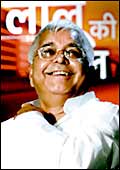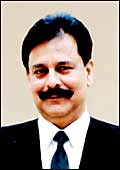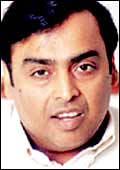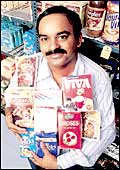|
HEADLINER
G.V. Prasad
FIRST THE GOOD NEWS:
Germany's fourth-largest generics marketer betapharm now
belongs to Dr Reddy's Labs (DRL), which agreed to pay m480 million
(Rs 2,544 crore) recently to buy it from private equity investor
3i. The deal, to be funded through a combination of internal accruals
and debt, gives DRL an immediate 3.5 per cent share of the largest
generics market outside the US. The bad news: DRL may have overpaid.
The deal price is three times betapharm's revenues, against the
accepted multiple of 1.75 to 2. Says Malvinder Singh of Ranbaxy
Laboratories, which was also a bidder: "Sometimes walking away
is also winning." CEO of the triumphant company, G.V. Prasad,
does not deny there were competitive pressures, but says that
the deal wasn't overpriced "if you look at the profitability"
of betapharm, which posted m40 million (Rs 212 crore) in EBITDA
last year. D-Street seems to agree with Prasad. His company's
stock was up almost 10 per cent to Rs 1,281 the day the deal was
announced.
-E. Kumar Sharma with Shalini S.
Dagar
Focussing On Petrochem
 |
| Indo Rama's Lohia: Change in focus |
O.P. Lohia of Indo Rama Group struck a deal
to sell his family's 49 per cent stake in Indo Rama Textiles to
Spentex Industries for about Rs 128 crore. Spentex already owns
15 per cent of Indo Rama Textiles, and will be making an open
offer to non-family shareholders. "The acquisition puts Spentex
among the top three yarn (manufacturers) in the country," Spentex's
Managing Director Mukand Choudhary said in a release. Lohia, on
his part, plans to focus on the petrochemicals business. His Indo
Rama Synthetics is the second largest polyester manufacturer in
India.
Novartis Trips On Patent
India's new patent regime in pharma may have just
been put through its first big test. India's Patent Office refused
Novartis a patent on its anti-cancer drug Glivec and agreed with
challenger Natco Pharma that it had merely tinkered with the original
molecule (patented in the us in 1993). In other words, "this was
a classic case of ever-greening", according to Hyderabad-based
Natco. Novartis, which also gives away Glivec through the Max
Foundation to those that cannot afford it and to others, sells
a month's course of the branded drug at Rs 1.10 lakh versus Rs
10,000 of local firms. Novartis may appeal.
 |
| Vedanta's Agarwal: Learning curve |
From Copper To Classes
Chairman of Vedanta Resources, Anil Agarwal, is
reportedly planning to set up a world-class university like Oxford
or Harvard at a cost of $1 billion (Rs 4,500 crore). To be called
Vedanta University, it will be launched by July 2008 and offer
courses in arts, engineering, law and medicine. Consulting firm
at Kearney will be advising.
NEWSMAKERS
LALU PRASAD YADAV
 |
| Turnaround man: At least
now he can afford a smile |
Railway
minister Lalu Prasad Yadav has been called many things: Badshah
of Bihar, strongman, canny, wily, casteist and a whole host of
less wholesome epithets. The latest is turnaround man; and he's
actually earned it the hard way-by delivering. The Indian Railways
is expecting to end 2005-06 with record net revenues of Rs 8,000
crore and a fund balance of Rs 11,000 crore. This will allow it
to transfer money-Rs 2,000 crore-to its Capital Fund, which is
used for long-term investment purposes, after a gap of eight years,
and pay the government Rs 3,500 crore as dividend. And it has
achieved all this despite absorbing a Rs 12 per litre hike in
diesel prices in five phases over the last year, and giving away
Rs 250 crore by way of discounts on short distance tickets.
What's the secret behind this turnaround?
Ministry officials say it was Yadav's decision to tap the unexploited
potential of the Indian Railways that did the trick. Giving a
20 per cent discount on freight in the "empty flow direction"
(when goods trains return to their points of origin after delivering
goods) substantially boosted revenues. Since running costs remained
constant, the entire additional revenue went straight to the bottom
line.
On the passenger side, e-ticketing has boosted
traffic. And its scheme of upgrading lower class passengers to
higher classes has led to a huge increase in capacity utilisation.
As a result, the railways expects its daily refunds of Rs 7 crore
a day to come down by about Rs 2 crore. These initiatives point
to a major change in mindset. "The Railways now operates
as a transporter and not as another government department,"
says a spokesperson.
-Shaleen Agrawal
NUMBERS
OF NOTE
17,000: The number of Indian
students in Britain, compared with nearly 80,000 in the US
4,000: The
number of Municipal Corporation of Delhi (MCD) officers and employees
found guilty of corruption or misconduct till January 15, 2006
1.3 billion:
Number of smokers worldwide. China accounts for about one-quarter
of the world's smokers, i.e., around 350 million
$250 billion
(Rs 11,25,000 crore): Worth of Indian retail sector in a year.
But it is heavily underdeveloped, over 95 per cent of the market
is made up of small, family-run stores
$168 million
(Rs 756 crore): The amount the Rolling Stones generated in
record and concert sales last year (2005). The band topped Forbes'
list of last year's biggest money makers in music, followed by
U2, which generated close to $150 million (Rs 675 crore)
$200 billion
(Rs 9,00,000 crore): China's trade surplus with the US. It
also has a $137 billion (Rs 6,16,500 crore) trade deficit with
the rest of Asia
$1.1 million
(Rs 4.95 crore): General Motors CEO Rick Wagoner's expected
salary in 2006, representing a 50 per cent cut over last year
(2005). GM suffered $8.4 billion (Rs 37,800 crore) loss on continuing
operations last year
42 million:
The number of sleeping pill prescriptions filled in the US
last year (2005), according to the research company IMS Health,
up nearly 60 per cent since 2000
 55,000:
The number of workers US-based business software maker Oracle
Corp. plans to employ worldwide shortly 55,000:
The number of workers US-based business software maker Oracle
Corp. plans to employ worldwide shortly
522 tonnes:
Amount of gold imported from Dubai by the rest of the world
in 2005. This is up from 502 tonnes in 2004, according to a recent
statement from the Dubai Metals and Commodities Centre (DMCC)
$15.3
billion (Rs 68,850 crore): The size of the US chocolate industry
A
Question of Trust
 Sahara
group supremo Subrata Roy has announced that he plans to transfer
all shares controlled by him in all his group companies to a trust
to pre-empt any split in the business. Disclosing his plans to
select newspapers, Roy said the trust would be headed by him but
have 60 members, just six or seven of whom would be family members.
"The trust is being made to ensure that no single person
can play around with the shares for his own benefit," Roy
told Business Standard. Sahara just exited the airline business
and could be looking for investors in its media and housing ventures
to focus on the core business of para-banking.
Sahara
group supremo Subrata Roy has announced that he plans to transfer
all shares controlled by him in all his group companies to a trust
to pre-empt any split in the business. Disclosing his plans to
select newspapers, Roy said the trust would be headed by him but
have 60 members, just six or seven of whom would be family members.
"The trust is being made to ensure that no single person
can play around with the shares for his own benefit," Roy
told Business Standard. Sahara just exited the airline business
and could be looking for investors in its media and housing ventures
to focus on the core business of para-banking.
NOTED
 RECALLED:
Clemenceau, the asbestos-lined warship, by French President
Jacques Chirac. The French high court has blocked its export to
India for dismantling. This was in response to complaints by Greenpeace
and anti-asbestos groups, which said the ship posed environmental
and health hazard. RECALLED:
Clemenceau, the asbestos-lined warship, by French President
Jacques Chirac. The French high court has blocked its export to
India for dismantling. This was in response to complaints by Greenpeace
and anti-asbestos groups, which said the ship posed environmental
and health hazard.
ACQUIRED: By
Aurobindo Pharma, UK generics drug firm Milpharm for an undisclosed
sum. Milpharm had revenues of £7.7 million (Rs 59 crore
approx.) in the year to September 2005. Aurobindo will use a part
of the proceeds from a $60-million (Rs 270 crore) convertible
bond issue raised in 2005 to fund the deal. This is Aurobindo's
first European acquisition.
PACT: Between
Tata Consultancy Services and Stanford University, for research
in data privacy. TCS will be investing $1 million (Rs 4.5 crore)
in this research collaboration. As part of the five-year agreement,
TCS will also become an industrial partner on data privacy in
the new Team for Research in Uniquitous Secure Technology (TRUST).
TRUST is a multi-university and multi-industry initiative that
includes UC Berkeley, Cornell University and Carnegie Mellon University,
Cisco Systems, HP, IBM, Intel, Microsoft, Qualcomm, Sun and Symantec.
 OVERSEAS
BORROWING: Of $1.5 billion (Rs 6,750 crore), by Reliance
Petroleum Ltd (RPL), a wholly-owned subsidiary of Reliance Industries
Ltd (RIL) through a mix of 10-year and seven-year loans. This
is the single-largest limited recourse financing mandated in the
Asian markets in recent years, excluding China, and the fourth-largest
single mandate in Asia in the last five years. The loan will be
used to finance the setting up of a new 27-million tpa refinery
and a 0.9-mtpa polypropylene complex. The total cost of the project
is $6 billion (Rs 27,000 crore). RPL also plans a domestic IPO. OVERSEAS
BORROWING: Of $1.5 billion (Rs 6,750 crore), by Reliance
Petroleum Ltd (RPL), a wholly-owned subsidiary of Reliance Industries
Ltd (RIL) through a mix of 10-year and seven-year loans. This
is the single-largest limited recourse financing mandated in the
Asian markets in recent years, excluding China, and the fourth-largest
single mandate in Asia in the last five years. The loan will be
used to finance the setting up of a new 27-million tpa refinery
and a 0.9-mtpa polypropylene complex. The total cost of the project
is $6 billion (Rs 27,000 crore). RPL also plans a domestic IPO.
MILESTONE: Reached
by Airtel, which has crossed the two million cellular phone customer
mark in Delhi.
BOUGHT: By United
Phosphorus Ltd (UPL), Advanta Netherlands Holdings BV, a supplier
of seeds and seed technology, for m100 million (Rs 530 crore approx.).
The acquisition, through United's Mauritius-based subsidiary,
would help UPL's strong entry into the global agri-biosciences
sector.
Subhiksha's
Makeover
 |
| Subramanian: A new experience |
Nine years after bare-bones
retailer Subhiksha opened its first store in Chennai, it is mulling
a makeover. It is switching from a serve-on-demand model to a
self-service format. "The customer has changed 10 years down
the line," says R. Subramanian, Managing Director, Subhiksha
Trading Services. Since space is at a premium, the retail chain
wants to increase sale per square foot without compromising with
its discount philosophy (discounts of up to 10 per cent are offered
on a range of items). Therefore, Subhiksha stores will relegate
dry groceries like sugar, dals, rice to the background (they will
be fetched for the asking) and bring several new "impulse
items" to the fore. "It is cosmetics, after shaves and
ready-to-eat items that are seeing very good sales," says
Subramanian. Simultaneously, the Rs 235-crore-in-revenues retailer
plans to open 800 new stores in markets like Andhra, Karnataka
and Delhi, in addition to the 145 it already has largely in Tamil
Nadu. Planned investment in the expansion: Rs 145 crore (for the
next four months). Subramanian, however, isn't straying too far
from his no-frills model. None of the new stores, like the existing
ones, will have air-conditioning.
-Nitya Varadarajan
|








 55,000
55,000
 RECALLED:
RECALLED:
 OVERSEAS
BORROWING:
OVERSEAS
BORROWING: 